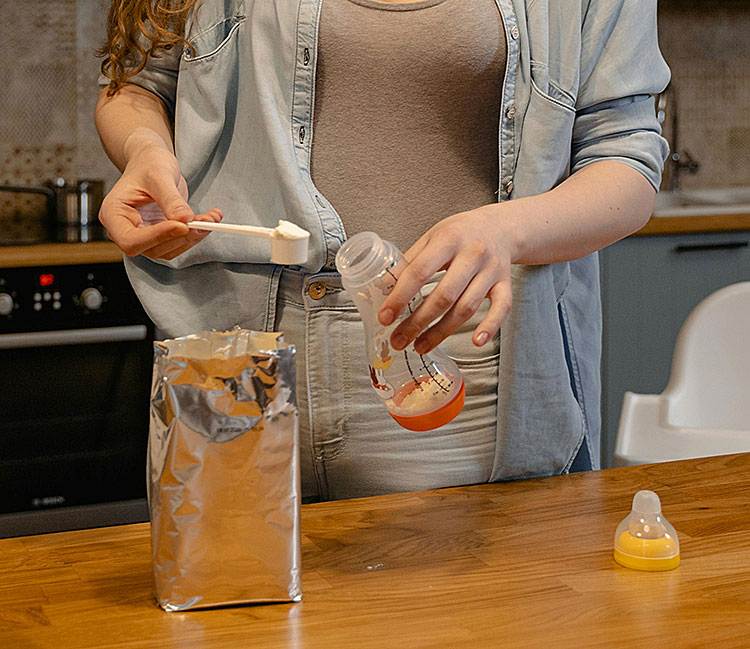By Jondi Gumz
On Aug. 27, California Attorney General Rob Bonta announced a settlement with Mead Johnson Nutrition Co. and Mead Johnson & Co., LLC, resolving allegations that Mead Johnson sold infant and toddler formulas without the required warnings for exposure to lead, a violation of Proposition 65 and the Unfair Competition Law.
![]() Mead Johnson will pay nearly $2 million, consisting of payments for the violations, reimbursement of a portion of legal costs, and funding for a supplemental environmental project designed to reduce other sources of lead exposure.
Mead Johnson will pay nearly $2 million, consisting of payments for the violations, reimbursement of a portion of legal costs, and funding for a supplemental environmental project designed to reduce other sources of lead exposure.
Mead Johnson also is required to maintain the now-reduced lead levels in the formula products sold in California that the 2018 complaint alleged had exceeded the level requiring Prop. 5 warning. That level is under 5 parts per billion of lead for milk formula and 7 parts per billion for soy formula.
The settlement resolves the allegations and those of a private Prop. 65 enforcer, Community Science Institute, a nonprofit in Ithaca, N.Y. that monitors water quality, which sued Target and Walmart, as their stores sold Mead Johnson baby formula.
Joining Bonta in the settlement are the district attorneys of 11 counties: Santa Cruz, which received $ 35,416, Alameda, Marin, Monterey, Napa, Orange, San Francisco, Santa Clara, Shasta, Solano, and Sonoma.
The Mayo Clinic and the U.S. Food and Drug Administration agree: There is no safe level of lead.
By law, food manufacturers have a responsibility to significantly minimize or prevent chemical hazards when needed, the FDA says on its website.
In January 2023 the FDA proposed to allow up to 10 parts per billion of lead in processed food for babies. This limit would not apply to baby formula.
Infant formula is one of the modern conveniences especially for mothers who have difficulty breast-feeding.
May Zhu, a registered Dietitian Nutritionist, recommends reading labels and avoiding corn syrup solids, high fructose corn syrup, soy protein isolate, which may be genetically modified, palm oil, artificial DHA and ARA fatty acids, and carrageenan, which may pose potential health risks to infants. The European Union banned carrageenan in infant formula.
The first infant formula powder was patented in 1865, a combination of cow’s milk, wheat and malt flour, and potassium bicarbonate, according to a history by Emily Stevens, family nurse practitioner and PhD, and her co-authors, published in the Journal of Perinatal Education in 2009.
In 1932, with the regulation of advertising, manufacturers could not solicit nonmedical personnel, so they reached out to physicians. By the 1940s and 1950s, physicians regarded the use of formula as a well known, popular, and safe substitute for breastmilk.
Currently, infant formula-feeding is widely practiced in the United States and appears to contribute to the development of several common childhood illnesses, including atopy, diabetes mellitus, and childhood obesity, according to Stevens and her co-authors.
Today, breast-feeding is making a comeback as new research finds breast-fed babies have more beneficial microbes such as bifidobacteria and lactobacillus in their gut improving gut health and the immune system. Babies born by C-section have fewer.
Mead Johnson was founded by Edward Mead Johnson in Jersey City, N.J., in 1905 and became majority owned by Bristol-Meyers Squibb in 1967. In 2009, it was spun off as an independent company, then in 2017 acquired by Reckitt-Benckiser, a British multinational firm, for $16.6 billion.
In 2022, the Federal Trade Commission reported Mead Johnson holds 39% of the infant formula market. Here are the other shares:
Abbott, founded in 1888 and acquired M & K Dietetics, maker of Similac baby formula, in 1964 for $43 million: 27%.
Nestle, the chocolate maker that acquired Gerber in 2007 for $5.5 million, 18%.
Perrigo, which got into formula in 1998 and in n 2022 bought Nestle’s Gateway formula plant and owns Nestle’s Good Start formula, 13%.
In 2022, the infant formula profit margin was estimated at 14.2%, according to IbisWorld data.
“Several of Mead Johnson’s infant and toddler formula products had been exposing children to elevated lead levels without a Proposition 65 warning,” said Bonta. “My office will work to ensure that corporations, including food and drug manufacturers, are accountable under state environmental and consumer laws.”
He added, “Mead Johnson has worked with us to ensure that the lead levels in its formula products are kept as low as possible, and it has also agreed to fund a supplemental environmental project to help keep families from being exposed to lead. I appreciate the partnership of the District Attorneys’ Offices across our State that led to this important settlement.”
“This judgment creates strong new protections and provides funds to assist eligible families in reducing their potential lead exposures,” said Alameda District Attorney Pamela Price.
The settlement resulted from an investigation of over 50 brands of formula sold into California.
The investigation found that Mead Johnson’s products contained lead at levels that required a warning for reproductive harm under Proposition 65, and that Mead Johnson had failed to provide such warnings, thereby violating both Proposition 65 and the Unfair Competition Law.
After being notified of the results of the investigation, Mead Johnson agreed to work with the Department of Justice and its District Attorney colleagues to take the steps necessary to minimize the lead levels in its products.
According to Bonta, Mead Johnson implemented changes to bring its products’ lead levels below the threshold that would trigger the requirement for Proposition 65 warnings, including changing the sourcing of some ingredients.
It requires Mead Johnson to pay a total of $850,000 pursuant to Proposition 65 and the Unfair Competition Law, $470,000 in reimbursement of attorneys’ fees and costs, and $850,000 for a supplemental environmental project targeted at reducing levels of lead in Californians’ home drinking water.
The settlement also imposes injunctive terms, including the requirement that Mead Johnson consult with an independent food quality auditor and conduct compliance testing to ensure that lead levels in its formula products are minimized.
•••
A copy of the settlement is at https://tinyurl.com/mead-johnson-2M-settle.



